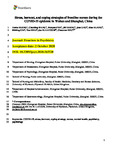Stress, burnout, and coping strategies of frontline nurses during the COVID-19 epidemic in Wuhan and Shanghai, China
| dc.contributor.author | Zhang, Y | |
| dc.contributor.author | WANG, C | |
| dc.contributor.author | PAN, W | |
| dc.contributor.author | Zheng, J | |
| dc.contributor.author | Gao, J | |
| dc.contributor.author | Huang, X | |
| dc.contributor.author | Cai, S | |
| dc.contributor.author | Zhai, Y | |
| dc.contributor.author | Latour, Jos M | |
| dc.contributor.author | Zhu, C | |
| dc.date.accessioned | 2020-10-03T09:52:19Z | |
| dc.date.issued | 2020-10-26 | |
| dc.identifier.issn | 1664-0640 | |
| dc.identifier.issn | 1664-0640 | |
| dc.identifier.other | ARTN 565520 | |
| dc.identifier.uri | http://hdl.handle.net/10026.1/16468 | |
| dc.description.abstract |
Background: Nurses at the frontline of caring for COVID-19 patients might experience mental health challenges and supportive coping strategies are needed to reduce their stress and burnout. The aim of this study was to identify stressors and burnout among frontline nurses caring for COVID-19 patients in Wuhan and Shanghai and to explore perceived effective morale support strategies. Method: A cross-sectional survey was conducted in March 2020 among 110 nurses from Zhongshan Hospital, Shanghai, who were deployed at COVID-19 units in Wuhan and Shanghai. A COVID-19 questionnaire was adapted from the previous developed "psychological impacts of SARS" questionnaire and included stressors (31 items), coping strategies (17 items), and effective support measures (16 items). Burnout was measured with the Maslach Burnout Inventory. Results: Totally, 107 (97%) nurses responded. Participants mean age was 30.28 years and 90.7% were females. Homesickness was most frequently reported as a stressor (96.3%). Seven of the 17 items related to coping strategies were undertaken by all participants. Burnout was observed in the emotional exhaustion and depersonalization subscales, with 78.5 and 92.5% of participants presenting mild levels of burnout, respectively. However, 52 (48.6%) participants experienced a severe lack of personal accomplishment. Participants with longer working hours in COVID-19 quarantine units presented higher emotional exhaustion (OR = 2.72, 95% CI 0.02-5.42; p = 0.049) and depersonalization (OR = 1.14, 95% CI 0.10-2.19; p = 0.033). Participants with younger age experienced higher emotional exhaustion (OR = 2.96, 95% CI 0.11-5.82; p = 0.042) and less personal accomplishment (OR = 3.80, 95% CI 0.47-7.13; p = 0.033). Conclusions: Nurses in this study experienced considerable stress and the most frequently reported stressors were related to families. Nurses who were younger and those working longer shift-time tended to present higher burnout levels. Psychological support strategies need to be organized and implemented to improve mental health among nurses during the COVID-19 pandemic. | |
| dc.format.extent | 565520- | |
| dc.format.medium | Electronic-eCollection | |
| dc.language | eng | |
| dc.language.iso | en | |
| dc.publisher | Frontiers Media | |
| dc.subject | COVID-19 | |
| dc.subject | stress | |
| dc.subject | burnout | |
| dc.subject | coping strategy | |
| dc.subject | nurses | |
| dc.subject | mental health | |
| dc.subject | psychology | |
| dc.subject | psychiatry | |
| dc.title | Stress, burnout, and coping strategies of frontline nurses during the COVID-19 epidemic in Wuhan and Shanghai, China | |
| dc.type | journal-article | |
| dc.type | Journal Article | |
| plymouth.author-url | https://www.webofscience.com/api/gateway?GWVersion=2&SrcApp=PARTNER_APP&SrcAuth=LinksAMR&KeyUT=WOS:000587383600001&DestLinkType=FullRecord&DestApp=ALL_WOS&UsrCustomerID=11bb513d99f797142bcfeffcc58ea008 | |
| plymouth.volume | 11 | |
| plymouth.publication-status | Published online | |
| plymouth.journal | Frontiers in Psychiatry | |
| dc.identifier.doi | 10.3389/fpsyt.2020.565520 | |
| plymouth.organisational-group | /Plymouth | |
| plymouth.organisational-group | /Plymouth/Faculty of Health | |
| plymouth.organisational-group | /Plymouth/Faculty of Health/School of Nursing and Midwifery | |
| plymouth.organisational-group | /Plymouth/REF 2021 Researchers by UoA | |
| plymouth.organisational-group | /Plymouth/REF 2021 Researchers by UoA/UoA03 Allied Health Professions, Dentistry, Nursing and Pharmacy | |
| plymouth.organisational-group | /Plymouth/Research Groups | |
| plymouth.organisational-group | /Plymouth/Research Groups/Institute of Health and Community | |
| plymouth.organisational-group | /Plymouth/Research Groups/Plymouth Institute of Health and Care Research (PIHR) | |
| plymouth.organisational-group | /Plymouth/Users by role | |
| plymouth.organisational-group | /Plymouth/Users by role/Academics | |
| dc.publisher.place | Switzerland | |
| dcterms.dateAccepted | 2020-10-02 | |
| dc.rights.embargodate | 2020-11-7 | |
| dc.identifier.eissn | 1664-0640 | |
| dc.rights.embargoperiod | Not known | |
| rioxxterms.versionofrecord | 10.3389/fpsyt.2020.565520 | |
| rioxxterms.licenseref.uri | http://www.rioxx.net/licenses/all-rights-reserved | |
| rioxxterms.licenseref.startdate | 2020-10-26 | |
| rioxxterms.type | Journal Article/Review |


